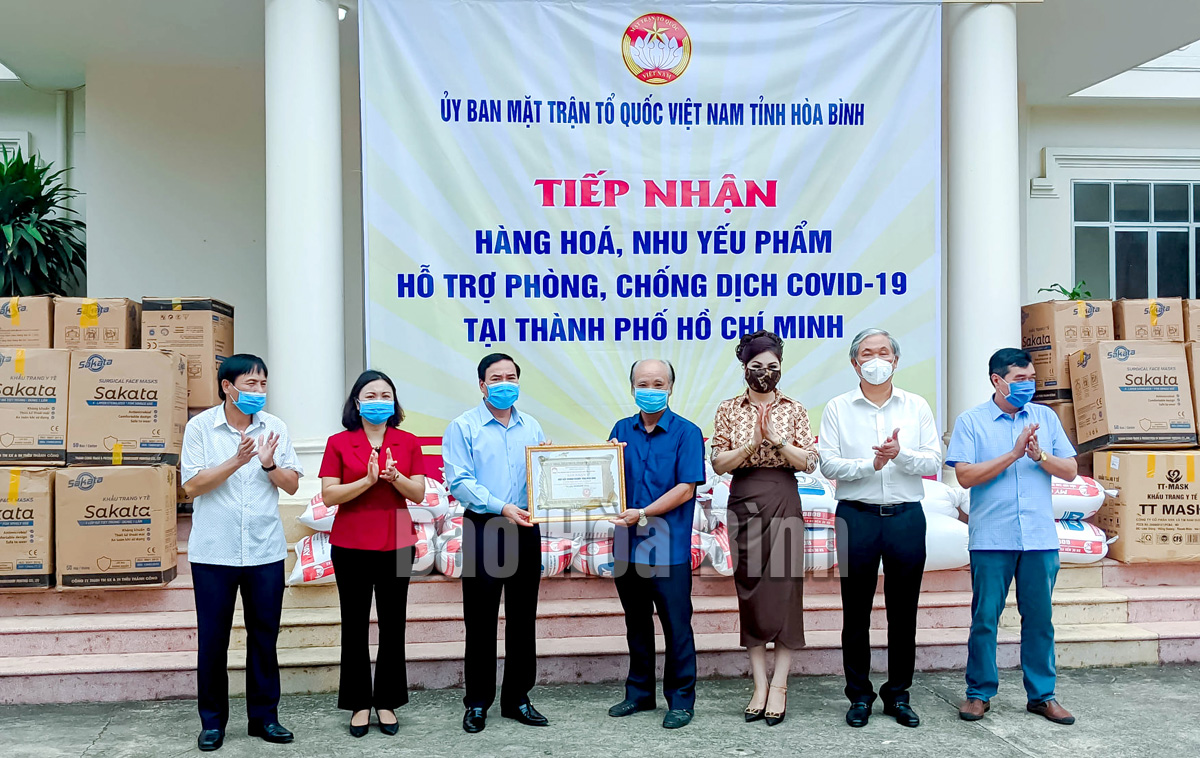
(HBO) – On the occasion of the Vietnam Entrepreneurs’ Day (October 13), Nguyen Cao Son, Chairman of the Business Association of Hoa Binh province, has granted an interview to Hoa Binh Newspaper, talking about notable contributions by the association as well as efforts by its members to weather the COVID-19 pandemic and help achieve the "twin targets”.
Members
of the provincial Business Association make donations in cash and in kind worth
tens of billions of VND to the fight against COVID-19.
Son said the resurgence of the COVID-19 pandemic
and its complex developments have greatly affected enterprises nationwide,
including those in Hoa Binh. It could be said that the province has succeeded
in bringing the outbreak under control. Authorities at all levels and sectors have
also carried out different solutions to assist and tackle problems facing
businesses and investors.
Apart from learning about its members’
aspirations and encouraging them to overcome difficulties, the business
association has also listened to their opinions so as to report to relevant
agencies and provincial leaders.
The association has effectively coordinated with
the provincial inspectorate while working with authorities to organise the
"Entrepreneurs’ Cafe” programme, where enterprises meet provincial leaders,
departments, and sectors to seek solutions to their problems. As a result,
obstacles to businesses and investors have been tackled and the local business
climate has been improved.
He held that the typical feature of Vietnamese
entrepreneurs and businesses, including those in Hoa Binh, is their national
pride, patriotism, and social responsibility. It is evidenced by their
donations in cash and in kind worth tens of billions of VND, along with their
charity programmes helping with the COVID-19 combat.
Son said the business association consists of 16
chapters operating in all 10 district-level localities in Hoa Binh. To help its
members recover, maintain, and expand operations, it will continue working to
have a good grasp of their production and business situation, including
advantages and difficulties, to report to authorities and submit proposals so
as to help create a favourable environment for the development of enterprises.
The association will also increase dialogues
between State agencies and companies to facilitate businesses’ recovery and
expansion, thereby actively contributing to the local economic development and
the realisation of the resolution adopted at the 17th provincial Party Congress
for the 2020 - 2025 tenure, he added./.
Hoa Binh province is undergoing a dynamic transformation amid Vietnam’s national digital transition. Building on Poliburo’s Resolution No. 57-NQ/TW on breakthroughs in science, technology, innovation, and national digital transformation, the province has rolled out a wide range of practical action plans. A standout initiative is the "Digital Literacy for All” movement, an effort to ensure that no one is left behind in the digital era.
Hoa Binh province is undergoing a dynamic transformation in the wake of the national digital transformation movement. Building on Resolution No. 57-NQ/TW of the Politburo on breakthroughs in science, technology, innovation, and national digital transformation, the province has implemented a wide range of practical action plans. A standout initiative is the "Digital Literacy for All” movement ambitious effort to ensure that no one is left behind in the digital age.
With a spirit of unity and proactive problem-solving, the Party Committee, the government and the people of Dong Lai Commune (Tan Lac District) have made great strides in implementing the resolutions of the 24th Party Congress of the commune for the 2020 - 2025 term. Focusing on leadership and practical actions, the commune has brought the Party’s resolutions into daily life, creating strong impacts and pushing the local development forward.
Amid the nationwide push for digital transformation, young people in Hoa Binh Province are stepping up as dynamic pioneers, applying technology to enhance Youth Union operations and expand the reach of youth-led initiatives. Through creativity and adaptability, Youth Union organizations at all levels have introduced a series of practical solutions, contributing to modern governance and community development.
In recent years, An Nghia commune, located in Lac Son district, has stepped up administrative reform, focusing on improving the quality and efficiency of its single-window service unit for receiving and processing administrative procedures. These improvements have helped create favourable conditions for local residents and organisations to handle administrative procedures, contributing to the commune’s broader socio-economic development.
The Prime Minister-approved master plan to develop the multi-use value of forests ecosystems through 2030, with a vision to 2050, aims to improve the management and sustainable use of forest resources, create jobs, increase incomes, and improve the living standards of ethnic minorities, people in mountainous and remote areas, forest workers and those living near forests.



